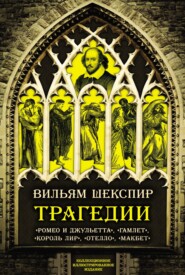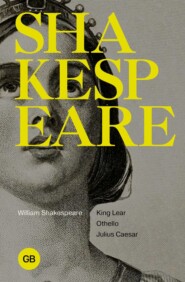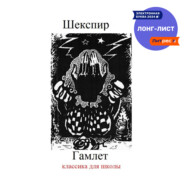По всем вопросам обращайтесь на: info@litportal.ru
(©) 2003-2024.
✖
The Passionate Pilgrim
Настройки чтения
Размер шрифта
Высота строк
Поля
The Passionate Pilgrim
Уильям Шекспир
William Shakespeare
The Passionate Pilgrim
I
Did not the heavenly rhetoric of thine eye,
'Gainst whom the world could not hold argument,
Persuade my heart to this false perjury?
Vows for thee broke deserve not punishment.
A woman I forswore; but I will prove,
Thou being a goddess, I forswore not thee:
My vow was earthly, thou a heavenly love;
Thy grace being gain'd cures all disgrace in me.
My vow was breath, and breath a vapour is;
Then, thou fair sun, that on this earth doth shine,
Exhale this vapour vow; in thee it is:
If broken, then it is no fault of mine.
If by me broke, what fool is not so wise
To break an oath, to win a paradise?
II
Sweet Cytherea, sitting by a brook
With young Adonis, lovely, fresh, and green,
Did court the lad with many a lovely look,
Such looks as none could look but beauty's queen.
She told him stories to delight his ear;
She show'd him favours to allure his eye;
To win his heart, she touch'd him here and there:
Touches so soft still conquer chastity.
But whether unripe years did want conceit,
Or he refus'd to take her figur'd proffer,
The tender nibbler would not touch the bait,
But smile and jest at every gentle offer:
Then fell she on her back, fair queen, and toward;
He rose and ran away; ah, fool too froward!
III
If love make me forsworn, how shall I swear to love?
O never faith could hold, if not to beauty vow'd:
Though to myself forsworn, to thee I'll constant prove;
Those thoughts, to me like oaks, to thee like osiers bow'd.
Study his bias leaves, and makes his book thine eyes,
Where all those pleasures live that art can comprehend.
If knowledge be the mark, to know thee shall suffice;
Well learned is that tongue that well can thee commend;
All ignorant that soul that sees thee without wonder;
Which is to me some praise, that I thy parts admire:
Thy eye Jove's lightning seems, thy voice his dreadful thunder,
Which (not to anger bent) is music and sweet fire.
Celestial as thou art, O do not love that wrong,
To sing heavens' praise with such an earthly tongue.
IV
Scarce had the sun dried up the dewy morn,
And scarce the herd gone to the hedge for shade,
When Cytherea, all in love forlorn,
A longing tarriance for Adonis made,
Under an osier growing by a brook,
A brook where Adon used to cool his spleen.
Hot was the day; she hotter that did look
For his approach, that often there had been.
Anon he comes, and throws his mantle by,
And stood stark naked on the brook's green brim;
The sun look'd on the world with glorious eye,
Yet not so wistly as this queen on him:
He, spying her, bounc'd in, whereas he stood;
O Jove, quoth she, why was not I a flood?
V
Fair is my love, but not so fair as fickle;
Mild as a dove, but neither true nor trusty;
Brighter than glass, and yet, as glass is, brittle;
Softer than wax, and yet, as iron, rusty:
A lily pale, with damask die to grace her,
None fairer, nor none falser to deface her.
Her lips to mine how often hath she join'd,
Between each kiss her oaths of true love swearing!
How many tales to please me hath she coin'd,
Dreading my love, the loss thereof still fearing!
Yet in the midst of all her pure protestings,
Her faith, her oaths, her tears, and all were jestings.
She burn'd with love, as straw with fire flameth;
She burn'd out love, as soon as straw outburneth;
She fram'd the love, and yet she foil'd the framing;
She bade love last, and yet she fell a turning.
Was this a lover, or a lecher whether?
Bad in the best, though excellent in neither.
VI
Уильям Шекспир
William Shakespeare
The Passionate Pilgrim
I
Did not the heavenly rhetoric of thine eye,
'Gainst whom the world could not hold argument,
Persuade my heart to this false perjury?
Vows for thee broke deserve not punishment.
A woman I forswore; but I will prove,
Thou being a goddess, I forswore not thee:
My vow was earthly, thou a heavenly love;
Thy grace being gain'd cures all disgrace in me.
My vow was breath, and breath a vapour is;
Then, thou fair sun, that on this earth doth shine,
Exhale this vapour vow; in thee it is:
If broken, then it is no fault of mine.
If by me broke, what fool is not so wise
To break an oath, to win a paradise?
II
Sweet Cytherea, sitting by a brook
With young Adonis, lovely, fresh, and green,
Did court the lad with many a lovely look,
Such looks as none could look but beauty's queen.
She told him stories to delight his ear;
She show'd him favours to allure his eye;
To win his heart, she touch'd him here and there:
Touches so soft still conquer chastity.
But whether unripe years did want conceit,
Or he refus'd to take her figur'd proffer,
The tender nibbler would not touch the bait,
But smile and jest at every gentle offer:
Then fell she on her back, fair queen, and toward;
He rose and ran away; ah, fool too froward!
III
If love make me forsworn, how shall I swear to love?
O never faith could hold, if not to beauty vow'd:
Though to myself forsworn, to thee I'll constant prove;
Those thoughts, to me like oaks, to thee like osiers bow'd.
Study his bias leaves, and makes his book thine eyes,
Where all those pleasures live that art can comprehend.
If knowledge be the mark, to know thee shall suffice;
Well learned is that tongue that well can thee commend;
All ignorant that soul that sees thee without wonder;
Which is to me some praise, that I thy parts admire:
Thy eye Jove's lightning seems, thy voice his dreadful thunder,
Which (not to anger bent) is music and sweet fire.
Celestial as thou art, O do not love that wrong,
To sing heavens' praise with such an earthly tongue.
IV
Scarce had the sun dried up the dewy morn,
And scarce the herd gone to the hedge for shade,
When Cytherea, all in love forlorn,
A longing tarriance for Adonis made,
Under an osier growing by a brook,
A brook where Adon used to cool his spleen.
Hot was the day; she hotter that did look
For his approach, that often there had been.
Anon he comes, and throws his mantle by,
And stood stark naked on the brook's green brim;
The sun look'd on the world with glorious eye,
Yet not so wistly as this queen on him:
He, spying her, bounc'd in, whereas he stood;
O Jove, quoth she, why was not I a flood?
V
Fair is my love, but not so fair as fickle;
Mild as a dove, but neither true nor trusty;
Brighter than glass, and yet, as glass is, brittle;
Softer than wax, and yet, as iron, rusty:
A lily pale, with damask die to grace her,
None fairer, nor none falser to deface her.
Her lips to mine how often hath she join'd,
Between each kiss her oaths of true love swearing!
How many tales to please me hath she coin'd,
Dreading my love, the loss thereof still fearing!
Yet in the midst of all her pure protestings,
Her faith, her oaths, her tears, and all were jestings.
She burn'd with love, as straw with fire flameth;
She burn'd out love, as soon as straw outburneth;
She fram'd the love, and yet she foil'd the framing;
She bade love last, and yet she fell a turning.
Was this a lover, or a lecher whether?
Bad in the best, though excellent in neither.
VI

















